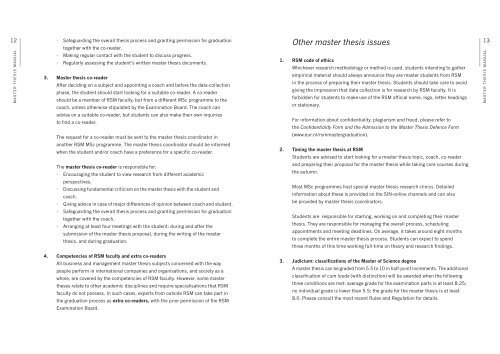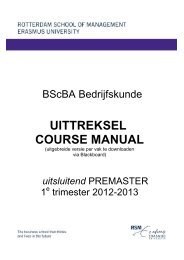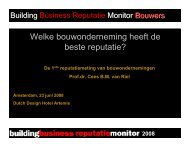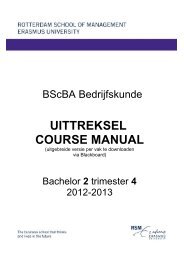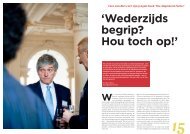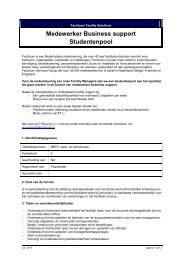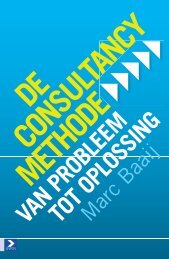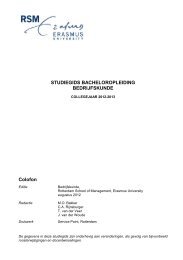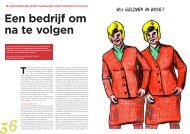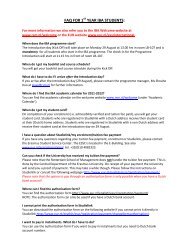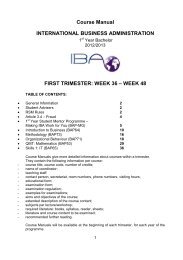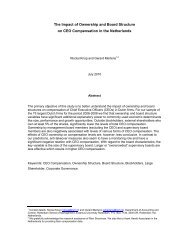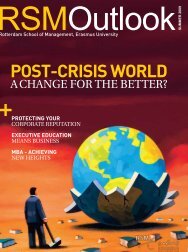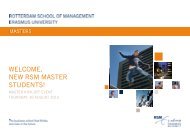master thesis manual rotterdam - Rotterdam School of Management
master thesis manual rotterdam - Rotterdam School of Management
master thesis manual rotterdam - Rotterdam School of Management
You also want an ePaper? Increase the reach of your titles
YUMPU automatically turns print PDFs into web optimized ePapers that Google loves.
12<br />
MASTER THESIS MANUAL<br />
• Safeguarding the overall <strong>thesis</strong> process and granting permission for graduation<br />
together with the co-reader.<br />
• Making regular contact with the student to discuss progress.<br />
• Regularly assessing the student’s written <strong>master</strong> <strong>thesis</strong> documents.<br />
3. Master <strong>thesis</strong> co-reader<br />
After deciding on a subject and appointing a coach and before the data-collection<br />
phase, the student should start looking for a suitable co-reader. A co-reader<br />
should be a member <strong>of</strong> RSM faculty, but from a different MSc programme to the<br />
coach, unless otherwise stipulated by the Examination Board. The coach can<br />
advise on a suitable co-reader, but students can also make their own inquiries<br />
to find a co-reader.<br />
The request for a co-reader must be sent to the <strong>master</strong> <strong>thesis</strong> coordinator in<br />
another RSM MSc programme. The <strong>master</strong> <strong>thesis</strong> coordinator should be informed<br />
when the student and/or coach have a preference for a specific co-reader.<br />
The <strong>master</strong> <strong>thesis</strong> co-reader is responsible for:<br />
• Encouraging the student to view research from different academic<br />
perspectives.<br />
• Discussing fundamental criticism on the <strong>master</strong> <strong>thesis</strong> with the student and<br />
coach.<br />
• Giving advice in case <strong>of</strong> major differences <strong>of</strong> opinion between coach and student.<br />
• Safeguarding the overall <strong>thesis</strong> process and granting permission for graduation<br />
together with the coach.<br />
• Arranging at least four meetings with the student: during and after the<br />
submission <strong>of</strong> the <strong>master</strong> <strong>thesis</strong> proposal, during the writing <strong>of</strong> the <strong>master</strong><br />
<strong>thesis</strong>, and during graduation.<br />
4. Competencies <strong>of</strong> RSM faculty and extra co-readers<br />
All business and management <strong>master</strong> <strong>thesis</strong> subjects concerned with the way<br />
people perform in international companies and organisations, and society as a<br />
whole, are covered by the competencies <strong>of</strong> RSM faculty. However, some <strong>master</strong><br />
theses relate to other academic disciplines and require specialisations that RSM<br />
faculty do not possess. In such cases, experts from outside RSM can take part in<br />
the graduation process as extra co-readers, with the prior permission <strong>of</strong> the RSM<br />
Examination Board.<br />
Other <strong>master</strong> <strong>thesis</strong> issues<br />
1. RSM code <strong>of</strong> ethics<br />
Whichever research methodology or method is used, students intending to gather<br />
empirical material should always announce they are <strong>master</strong> students from RSM<br />
in the process <strong>of</strong> preparing their <strong>master</strong> <strong>thesis</strong>. Students should take care to avoid<br />
giving the impression that data collection is for research by RSM faculty. It is<br />
forbidden for students to make use <strong>of</strong> the RSM <strong>of</strong>ficial name, logo, letter headings<br />
or stationary.<br />
For information about confidentiality, plagiarism and fraud, please refer to<br />
the Confidentiality Form and the Admission to the Master Thesis Defence Form<br />
(www.eur.nl/rsm<strong>master</strong>graduation).<br />
2. Timing the <strong>master</strong> <strong>thesis</strong> at RSM<br />
Students are advised to start looking for a <strong>master</strong> <strong>thesis</strong> topic, coach, co-reader<br />
and preparing their proposal for the <strong>master</strong> <strong>thesis</strong> while taking core courses during<br />
the autumn.<br />
Most MSc programmes host special <strong>master</strong> <strong>thesis</strong> research clinics. Detailed<br />
information about these is provided on the SIN-online channels and can also<br />
be provided by <strong>master</strong> <strong>thesis</strong> coordinators.<br />
Students are responsible for starting, working on and completing their <strong>master</strong><br />
<strong>thesis</strong>. They are responsible for managing the overall process, scheduling<br />
appointments and meeting deadlines. On average, it takes around eight months<br />
to complete the entire <strong>master</strong> <strong>thesis</strong> process. Students can expect to spend<br />
three months <strong>of</strong> this time working full-time on theory and research findings.<br />
3. Judicium: classifications <strong>of</strong> the Master <strong>of</strong> Science degree<br />
A <strong>master</strong> <strong>thesis</strong> can be graded from 5.5 to 10 in half-point increments. The additional<br />
classification <strong>of</strong> cum laude (with distinction) will be awarded when the following<br />
three conditions are met: average grade for the examination parts is at least 8.25;<br />
no individual grade is lower than 5.5; the grade for the <strong>master</strong> <strong>thesis</strong> is at least<br />
8.0. Please consult the most recent Rules and Regulation for details.<br />
13<br />
MASTER THESIS MANUAL


